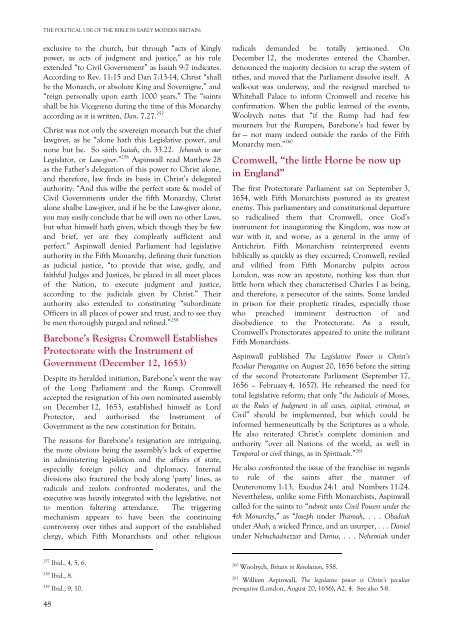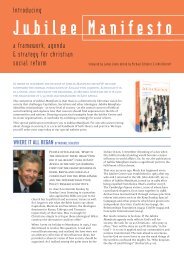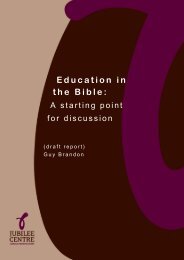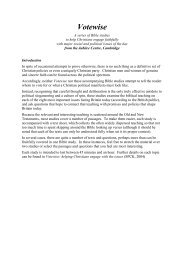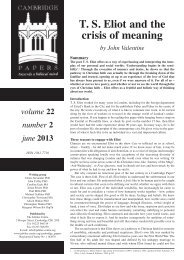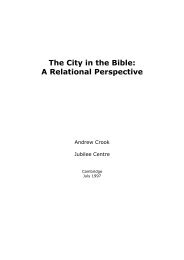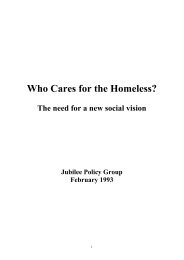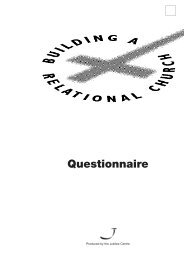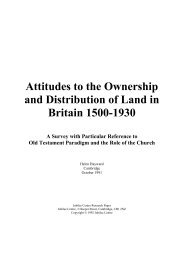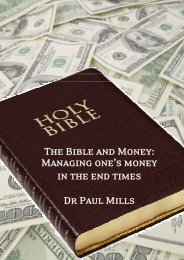Report Template - Jubilee Centre
Report Template - Jubilee Centre
Report Template - Jubilee Centre
You also want an ePaper? Increase the reach of your titles
YUMPU automatically turns print PDFs into web optimized ePapers that Google loves.
THE POLITICAL USE OF THE BIBLE IN EARLY MODERN BRITAIN:<br />
exclusive to the church, but through “acts of Kingly<br />
power, as acts of judgment and justice,” as his rule<br />
extended “to Civil Government” as Isaiah 9:7 indicates.<br />
According to Rev. 11:15 and Dan 7:13-14, Christ “shall<br />
be the Monarch, or absolute King and Soveraigne,” and<br />
“reign personally upon earth 1000 years.” The “saints<br />
shall be his Vicegerents during the time of this Monarchy<br />
according as it is written, Dan. 7.27. 257<br />
Christ was not only the sovereign monarch but the chief<br />
lawgiver, as he “alone hath this Legislative power, and<br />
none but he. So saith Isaiah, ch. 33.22. Jehovah is our<br />
Legislator, or Law-giver.” 258 Aspinwall read Matthew 28<br />
as the Father’s delegation of this power to Christ alone,<br />
and therefore, law finds its basis in Christ’s delegated<br />
authority: “And this wilbe the perfect state & model of<br />
Civil Governments under the fifth Monarchy, Christ<br />
alone shalbe Law-giver, and if he be the Law-giver alone,<br />
you may easily conclude that he will own no other Laws,<br />
but what himself hath given, which though they be few<br />
and brief, yet are they compleatly sufficient and<br />
perfect.” Aspinwall denied Parliament had legislative<br />
authority in the Fifth Monarchy, defining their function<br />
as judicial justice, “to provide that wise, godly, and<br />
faithful Judges and Justices, be placed in all meet places<br />
of the Nation, to execute judgment and justice,<br />
according to the judicials given by Christ.” Their<br />
authority also extended to constituting “subordinate<br />
Officers in all places of power and trust, and to see they<br />
be men thoroughly purged and refined.” 259<br />
Barebone’s Resigns: Cromwell Establishes<br />
Protectorate with the Instrument of<br />
Government (December 12, 1653)<br />
Despite its heralded initiation, Barebone’s went the way<br />
of the Long Parliament and the Rump. Cromwell<br />
accepted the resignation of his own nominated assembly<br />
on December 12, 1653, established himself as Lord<br />
Protector, and authorised the Instrument of<br />
Government as the new constitution for Britain.<br />
The reasons for Barebone’s resignation are intriguing,<br />
the more obvious being the assembly’s lack of expertise<br />
in administering legislation and the affairs of state,<br />
especially foreign policy and diplomacy. Internal<br />
divisions also fractured the body along ‘party’ lines, as<br />
radicals and zealots confronted moderates, and the<br />
executive was heavily integrated with the legislative, not<br />
to mention faltering attendance. The triggering<br />
mechanism appears to have been the continuing<br />
controversy over tithes and support of the established<br />
clergy, which Fifth Monarchists and other religious<br />
radicals demanded be totally jettisoned. On<br />
December 12, the moderates entered the Chamber,<br />
denounced the majority decision to scrap the system of<br />
tithes, and moved that the Parliament dissolve itself. A<br />
walk-out was underway, and the resigned marched to<br />
Whitehall Palace to inform Cromwell and receive his<br />
confirmation. When the public learned of the events,<br />
Woolrych notes that “if the Rump had had few<br />
mourners but the Rumpers, Barebone’s had fewer by<br />
far — not many indeed outside the ranks of the Fifth<br />
Monarchy men.” 260<br />
Cromwell, “the little Horne be now up<br />
in England”<br />
The first Protectorate Parliament sat on September 3,<br />
1654, with Fifth Monarchists postured as its greatest<br />
enemy. This parliamentary and constitutional departure<br />
so radicalised them that Cromwell, once God’s<br />
instrument for inaugurating the Kingdom, was now at<br />
war with it, and worse, as a general in the army of<br />
Antichrist. Fifth Monarchists reinterpreted events<br />
biblically as quickly as they occurred; Cromwell, reviled<br />
and vilified from Fifth Monarchy pulpits across<br />
London, was now an apostate, nothing less than that<br />
little horn which they characterised Charles I as being,<br />
and therefore, a persecutor of the saints. Some landed<br />
in prison for their prophetic tirades, especially those<br />
who preached imminent destruction of and<br />
disobedience to the Protectorate. As a result,<br />
Cromwell’s Protectorates appeared to unite the militant<br />
Fifth Monarchists.<br />
Aspinwall published The Legislative Power is Christ’s<br />
Peculiar Prerogative on August 20, 1656 before the sitting<br />
of the second Protectorate Parliament (September 17,<br />
1656 – February 4, 1657). He rehearsed the need for<br />
total legislative reform; that only “the Judicials of Moses,<br />
as the Rules of Judgment in all cases, capital, criminal, or<br />
Civil” should be implemented, but which could be<br />
informed hermeneutically by the Scriptures as a whole.<br />
He also reiterated Christ’s complete dominion and<br />
authority “over all Nations of the world, as well in<br />
Temporal or civil things, as in Spirituals.” 261<br />
He also confronted the issue of the franchise in regards<br />
to rule of the saints after the manner of<br />
Deuteronomy 1:13, Exodus 24:1 and Numbers 11:24.<br />
Nevertheless, unlike some Fifth Monarchists, Aspinwall<br />
called for the saints to “submit unto Civil Powers under the<br />
4th Monarchy,” as “Joseph under Pharoah, . . . Obadiah<br />
under Ahab, a wicked Prince, and an usurper, . . . Daniel<br />
under Nebuchadnezzar and Darius, . . . Nehemiah under<br />
257<br />
Ibid., 4, 5, 6.<br />
258<br />
Ibid., 8.<br />
259<br />
Ibid., 9, 10.<br />
260<br />
Woolrych, Britain in Revolution, 558.<br />
261<br />
William Aspinwall, The legislative power is Christ’s peculiar<br />
prerogative (London, August 20, 1656), A2, 4. See also 5-8.<br />
48


